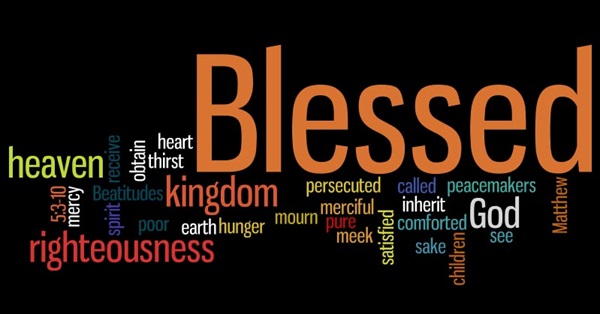
Blessedness of true Christian
The days have melted into weeks; and the weeks almost into a month. Tomorrow is the last Sunday of the first month of the New Year.
Advertisement
As January ends, we begin to think over our progress in the first four weeks of the year.
We all need a word to encourage us. And we all need a word to challenge us to focus on “who you are intended to become in Jesus Christ.”
That is the theme of the Beatitudes, at the beginning of Jesus’ sermon on the mountain. He tells us how to become a true human being, who you are intended to be. In fact, the entire Sermon on the Mount is Jesus’ basic lesson on becoming a true Christ-like person.
The Beatitudes are eight characteristics of a true Christian. They are eight ways to become true and authentic Christ-like persons. That is our destiny as true followers of Jesus Christ.
The Beatitudes are:
o “Blessed are the poor in spirit, for theirs is the kingdom of heaven.
o Blessed are those who mourn, for they shall be comforted.
o Blessed are the meek, for they shall inherit the earth.
o Blessed are those who hunger and thirst for righteousness, for they shall be satisfied.
o Blessed are the merciful, for they shall receive mercy.
o Blessed are the pure in heart, for they shall see God.
o Blessed are the peacemakers, for they shall be called sons of God.
o Blessed are those who are persecuted for righteousness' sake, for theirs is the kingdom of heaven.
o Blessed are you when others revile you and persecute you and utter all kinds of evil against you falsely on my account.” (Matthew 5:3-11 ESV).
My personal 9th Beatitude is: “Blessed are those who have nothing to hide, for they shall not be found out.” The Apostle Paul says, “I live for Christ and serve Him with a clear conscience.”
But before we go on to discuss the eight Beatitudes, what does the word “Blessed” here in the Beatitudes actually mean? We are told in the Bible passages such as Psalms 1; the Beatitudes of Matthew 5; and Luke 6 that the word “Blessed” actually means “happy”.
“Blessed is the man who walks not in the counsel of the wicked, nor stands in the way of sinners, nor sits in the seat of scoffers; but his delight is in the law of the Lord, and in his law, he meditates day and night. He is like a tree planted by streams of water that yields its fruit in its season, and its leaf does not wither. In all that he does, he prospers.
Randy Alcorn, comments: “The word “Happiness” was once central to the vocabulary of God’s people. At the time of the translation of the King James Version of the Bible, “Blessedness” meant “happiness” in the Dictionary of that time. This is evidenced by the 1828 edition of Noah Webster’s dictionary, which defined blessed this way: “Made happy or prosperous; extolled; pronounced happy.
Happy; prosperous in worldly affairs; enjoying spiritual happiness and the favour of God; enjoying heavenly felicity.” Meanings of words have changed over time. We should give happiness its proper Biblical context, celebrate it and embrace it as a vital part of the Gospel, the Good News of Christ.
The Beatitudes are referred to as the Be-attitudes that true followers of Jesus must have. In fact, the Beatitudes are also seen as the celebration of what God offers the true believer – “O the blessedness of ….” or “O the happiness of…..” the true believer. What Christ intends him or her to be in union with Him.
Randy Alcorn notes, “This happiness spoken of in scripture cannot be found in sin but only in God.” “Speaking about Christ-centred happiness is fully in harmony with pointing out the many passages demonstrating that prosperity theology or more precisely, materialism, or health and wealth theology is wrong, and that often our life circumstances will be difficult, and that sorrow and grief are also part of the true Christian life.”
Perhaps, it is rather dangerous not to recognise the happiness in God that the Bible clearly teaches (e.g. Psalms 1, Matthew 5:3-11).
Will people not be more attracted to the Gospel, if they are told about what Scripture truly teaches: “A happy God and His offer of a deep abiding happiness in Christ that begins now and goes on forever? Yes, they will.” Obviously, the offer of happiness alone is not the whole Gospel. But since God Himself calls the Gospels, “the Good News of Happiness” – “How beautiful upon the mountains are the feet of him who brings good news, who publishes peace, who brings good news of happiness, who publishes salvation, who says to Zion, “Your God reigns.” (Isaiah 52:7 ESV); we should see happiness as a vital part of the Gospel.
If people read in the Beatitudes, “happy are those who mourn, for they shall be comforted,” they would probably be struck by a paradox. Happiness and mourning at the same time? How is that even possible? “But that is what Jesus wanted His listeners to realise. He was offering them something other than what is common and usual, even the miraculous.” Here is something God - given that could never come from human invention or positive thinking.
The Full Gospel Business Men Fellowship International (FGBMFI) are right – “The happiest people on earth” are true Christians.




